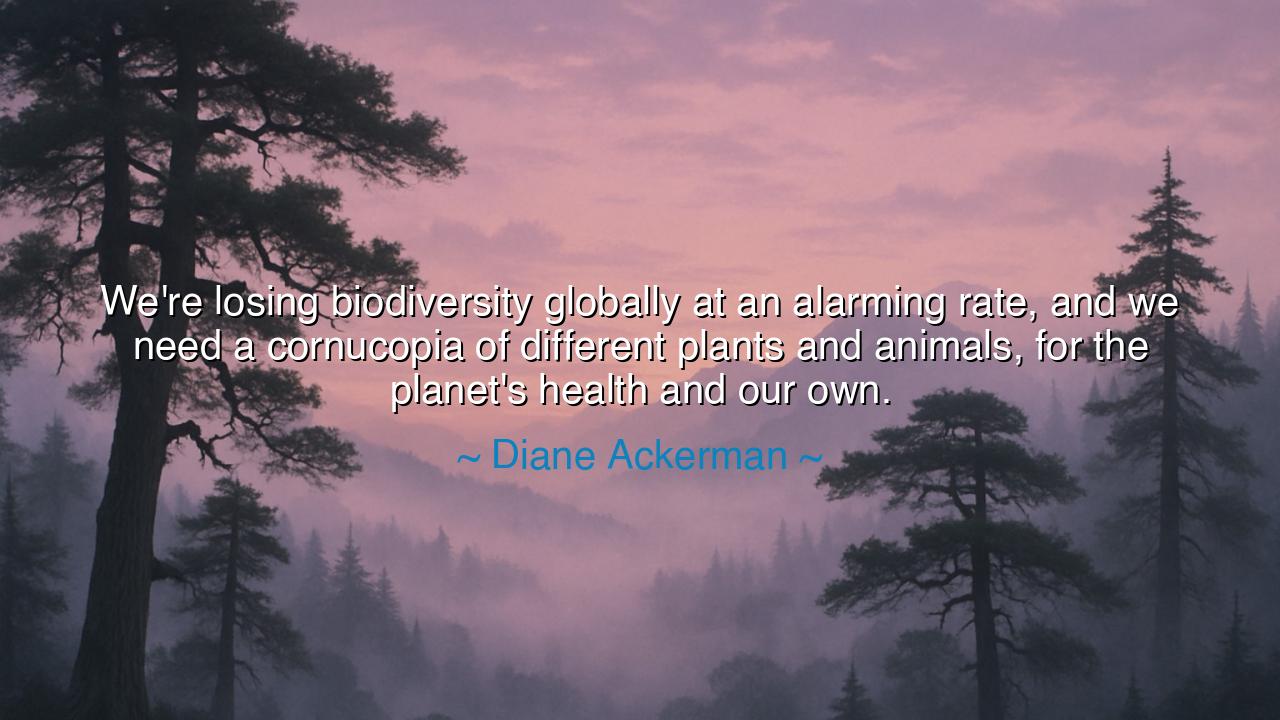
We're losing biodiversity globally at an alarming rate, and we
We're losing biodiversity globally at an alarming rate, and we need a cornucopia of different plants and animals, for the planet's health and our own.






“We’re losing biodiversity globally at an alarming rate, and we need a cornucopia of different plants and animals, for the planet’s health and our own.” — thus spoke Diane Ackerman, the poet of nature, the chronicler of wonder who listens to the heartbeat of the Earth. In this warning, veiled in the beauty of language, she calls humanity to remembrance — to awaken to the truth that the living world is not a collection of resources, but a sacred tapestry, woven from countless forms of life, each thread vital to the whole. Her words, though spoken in our time, echo the wisdom of the ancients who knew that to harm the land is to wound oneself, for human health and planetary health are one and the same.
The meaning of Ackerman’s words is both simple and profound: the biodiversity of the Earth — its variety of life — is the source of all balance, resilience, and renewal. The forests breathe for us; the bees and birds labor silently to sustain the harvest; the unseen microbes enrich the soil and cleanse the air. Yet we, in our haste and hunger, have forgotten this covenant. We cut, burn, and consume as though the web of life were endless, and in doing so, we unravel our own future. The “alarming rate” of loss she speaks of is no metaphor — it is the measure of our blindness, the speed at which the songs of creation fall silent.
The ancients once told of a garden — a paradise in which every living thing was placed in harmony with the rest. To dwell there required reverence, not dominion; stewardship, not greed. But man, desiring mastery, broke the balance and was cast into toil and exile. Ackerman’s quote is a mirror of that ancient tale — for again, we stand on the edge of exile, banishing ourselves from the living garden of Earth. The loss of species, the bleaching of reefs, the burning of forests — these are not distant tragedies. They are signs that the cornucopia of life, once overflowing, now runs dry. And when the Earth grows barren, the spirit of humanity withers alongside it.
Let us remember a lesson from history: the fall of Easter Island, a green jewel once rich with birds, trees, and thriving people. Its inhabitants, driven by ambition, felled every tree to build monuments, until none remained. Without trees, the soil eroded, the birds vanished, and the people starved. Their statues still stand, gazing toward the horizon, mute witnesses to the truth that no civilization can outlive its environment. The same fate threatens our own world if we continue to mistake abundance for permanence. Ackerman’s warning is not new — but it is urgent, for we now wield powers far greater and more destructive than the islanders ever did.
The “cornucopia” she invokes is not a mere symbol of plenty — it is the sacred abundance of diversity itself. Every species, from the towering redwood to the humblest worm, plays a role in the grand design. To lose even one is to diminish the strength of the whole. The planet’s health, she reminds us, depends not on domination but on diversity. And just as the Earth weakens when its ecosystems collapse, so do we weaken — physically, spiritually, emotionally — when we sever our bond with the natural world. Our own health mirrors that of the planet, for the air we breathe, the water we drink, the food we eat, and even the medicines that heal us all arise from this living symphony.
Yet Ackerman’s words, though solemn, are not devoid of hope. The same hands that destroy can also restore. The forests can be replanted, the rivers cleansed, the species protected. All it requires is remembrance — that ancient understanding that we are stewards, not rulers, of the Earth. Already, there are those who labor for this vision: communities rewilding the land, scientists reviving extinct seeds, and ordinary people planting trees in defiance of despair. Every act of care, however small, is a thread rewoven into the great fabric of life.
The lesson, then, is clear and sacred: if we wish to survive, we must honor the diversity that sustains us. The loss of one creature is the loss of a verse from the song of creation. Let us act, therefore, not as conquerors but as caretakers. Teach your children the names of birds and flowers. Protect the wilderness not as luxury, but as necessity. Eat and consume with reverence. Support those who guard the Earth’s remaining wild places. For as Ackerman teaches, to preserve biodiversity is to preserve ourselves — body, spirit, and future alike.
So, children of the living world, remember this truth: life thrives only in diversity. The strength of the Earth lies not in sameness, but in the harmony of differences. Cherish it, defend it, and let your actions restore the cornucopia that has nourished every generation before us. For the fate of the planet’s health, and the fate of our own, are bound together — one breath, one heartbeat, one sacred home.






AAdministratorAdministrator
Welcome, honored guests. Please leave a comment, we will respond soon